
Shocking Sea Level Rise Predicted Even If We Limit Global Warming to 1.5°C!
2025-05-20
Author: Sarah
The Alarming Reality of Rising Seas
Even if nations achieve the ambitious goal of capping global warming at 1.5 degrees Celsius, rising sea levels could devastate coastal areas and challenge humanity's resilience, according to a recent study led by Professor Chris Stokes from Durham University. The research highlights that the rate of ocean rise has already doubled in the last 30 years and could double again by 2100, reaching about one centimeter each year.
A Major Achievement, Yet a Daunting Challenge
"Limiting global warming to 1.5C would be a monumental success," Professor Stokes stated. However, he warns that even with this achievement, the acceleration of sea level rise will become increasingly difficult to manage.
Devastating Economic Impact
Without protective structures like sea walls, we could see an additional 20 centimeters (7.8 inches) in sea levels by 2050—an increase that could result in an astounding $1 trillion in annual flood damages across the world's largest coastal cities.
Vulnerable Populations
Currently, approximately 230 million people reside just one meter above sea level, while over a billion live within 10 meters, making them extremely vulnerable to flooding and displacement.
What’s Causing This Threat?
The rising seas are primarily driven by two factors: the melting of ice sheets and mountain glaciers, and the thermal expansion of oceans that are absorbing more than 90% of the excess heat from climate change.
A Critical Temperature Check
Earth's surface temperature now stands at 1.2C above pre-industrial levels—already enough to potentially elevate sea levels by several meters over the coming centuries. Scientists project that, without significant action, global temperatures could rise 2.7C by the century's end.
The Ice Sheet Threat
In examining scientific data, Stokes and his team found that ice sheets are contributing increasingly to sea level rise. Research from the UN's Intergovernmental Panel on Climate Change (IPCC) indicates that sea levels could rise by 40 to 80 centimeters by 2100, and new evidence suggests these estimates may be on the low end.
Understanding Tipping Points and Historical Context
The consensus has shifted dramatically; ice sheets, especially in Greenland and West Antarctica, could begin to collapse at a mere 1.5C of warming—much sooner than previously thought. Historical climate data reveals that during warmer periods, sea levels were significantly higher even with lower global temperatures.
Urgent Action Required!
To mitigate sea level rise, experts suggest reversing the current warming trend to achieve long-term temperature goals close to or below 1C. The urgency for climate action has never been clearer, as rising seas could pose one of the biggest threats of the century.
Conclusion
In light of these alarming findings, it is vital for policymakers and citizens alike to recognize the imminent risks posed by climate change and take decisive action to combat it. As the clock ticks, our planet's fate hangs in the balance.


 Brasil (PT)
Brasil (PT)
 Canada (EN)
Canada (EN)
 Chile (ES)
Chile (ES)
 Česko (CS)
Česko (CS)
 대한민국 (KO)
대한민국 (KO)
 España (ES)
España (ES)
 France (FR)
France (FR)
 Hong Kong (EN)
Hong Kong (EN)
 Italia (IT)
Italia (IT)
 日本 (JA)
日本 (JA)
 Magyarország (HU)
Magyarország (HU)
 Norge (NO)
Norge (NO)
 Polska (PL)
Polska (PL)
 Schweiz (DE)
Schweiz (DE)
 Singapore (EN)
Singapore (EN)
 Sverige (SV)
Sverige (SV)
 Suomi (FI)
Suomi (FI)
 Türkiye (TR)
Türkiye (TR)
 الإمارات العربية المتحدة (AR)
الإمارات العربية المتحدة (AR)